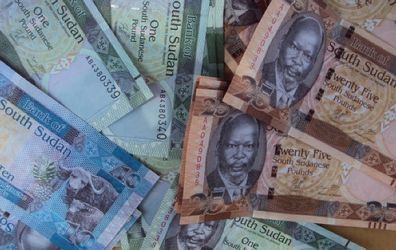South Sudan allows free floating foreign exchange rate
December 15, 2015 (JUBA) – South Sudan has abandoned a fixed exchange rate and surrendered its currency, the South Sudanese pound, to trade freely in the market against the US dollar and other foreign currencies, to compete with the black market.

He did not elaborate on when the salary increment will come into effect and where to get the money to top up the salaries in the face of the economic crisis in the country.
Athorbei declared that there will be no more official rate for the pound against the US dollar and other foreign currencies. He said the foreign exchange rate in the country will now be managed by market forces of demand and supply and the government will occasionally supply the markets at the same rate.
“To minimize the effects of these reforms, the government will undertake to raise the salaries of the lower income group, said the finance minister.
He warned people to expect losses in the short term although he expressed hope that the government could benefit from the free floating foreign exchange rate in the long term.
“Although we expect a lot of benefits to our country as a result of these reforms, it is also true that these measures will suddenly have some adverse effects on our people particularly in the short term,” warned Athorbei, who was joined at the press conference by the governor of central bank, Kornelio Koryom Mayiik.
He said the government will now undertake to enlighten the public about the difficulties the people would be facing as the new monetary measures are enforced.
“I therefore ask all of you to be patient as we undertake these difficult necessary reform measures,” he appealed.
Speaking at the same news conference, central bank governor Kornelio Koriom Mayiik attributed the cause of the decision to reduction in the oil output due to the the war that erupted two years ago on 15 December 2013.
Mayiik explained that the decline in crude oil revenues and oil prices that have plunged below $40 a barrel have resulted in dollar shortages that weighed on the local currency and caused the value of the greenback to soar in the black market.
He appealed to the international community to help the country make the switch as it doesn’t have the reserves to back a move to the free-floating currency.
He said the previous system of managed floating exchange rate has made the move because rich people would buy the currency at the official rate and then sell it to the poor.
“We are being driven by the supply and demand of commodities on the market, “said Mayik admitting the devaluing the pound was just a formal way but it already existed in the market.
“The money was already devalued. People were no longer receiving money at the official rate and nobody could control it.”
The top bank official said there were already parallel rate, an official exchange rate of 2.96 South Sudanese pounds per US dollar set by the central bank, and another rate based on supply and demand in the market.
He said the move will now encourage international humanitarian and development organisations as well as foreign investors to inject more hard currencies into circulation and to increase government revenue as there will be no fixing for business, development and job opportunities.
The changes have reversed the previous system in which individuals were able to access dollars at the official rate set at 2.96 South Sudanese pounds per US dollar by the central bank while majority go to the market.
With the introduction of the new policy, he said, everybody would now be able to access US dollars at a similar rate. The central bank will from time to time make avail dollars to those that would sell or buy.
Senior government officials, including top management of the central bank had been selling US dollars in the black market at the expense of the poor.
This latest move to float the local currency is seen to have resulted from lack of hard currency reserves either in the central bank or in the account of the ministry of finance and economic planning.
Local banks have responded to the sudden change of the government’s monetary policy with the Kenyan Commercial Bank (KCB) in Juba on Tuesday setting the exchange rate to 20 South Sudanese pounds against 1 dollar.
(ST)
